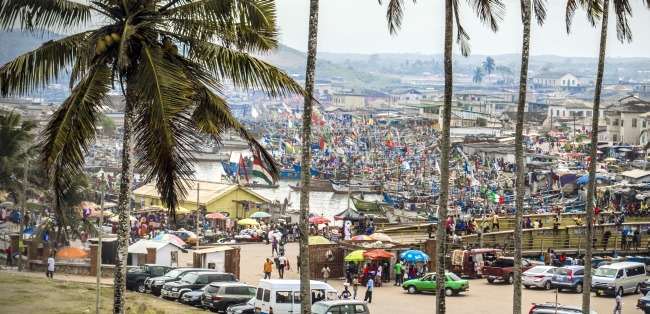The 16th International River Symposium, taking place in Brisbane this week, provides an opportunity to look at how urban areas influence rivers and the links between water, food and energy. Jeremy Bird, Director General of the International Water Management Institute (IWMI), is speaking at the symposium on the essential role of resource recovery and reuse to address increasing pollution which is of significance at basin scale.
On the outskirts of the city of Accra, Ghana, colorful water tankers are a common sight, weaving through the traffic. The tankers are much needed since water supplies from the main piped water system are grossly inadequate. As a result many householders rely upon these deliveries for all their domestic needs. Consumers pay for the service, of course, but there is a cost beyond the mere inconvenience of the system. Besides high costs contamination of water is a major problem. While some tankers go and deliver drinking water to households, the next trip might be to carry dam water to a construction site.

Accra’s problems are not unique. As cities expand globally and the urban fringe proliferates, competition for water becomes a major management challenge. Fast growing demand in built up areas is now having a profound influence on natural resource management often affecting areas many kilometers away from the urban sprawl. Nowhere is this more apparent than in the water sector
Uncontrolled expansion
The reality for hundreds of towns and cities is one of rapid and relatively uncontrolled expansion. UN-HABITAT estimates that every day, between 2010 and 2015, almost 200,000 people are added to the world’s cities. 91% of that growth is in cities of the developing world.
“As urban areas tend to have priority of water, this development places increasing stress on the rural hinterland”, says Jeremy Bird, Director General of the International Water Management Institute (IWMI). “Increasingly water demanding diets of the population need to be met as well as water demands for industrial use and electricity generation.”
Sinks versus sponges
In the conventional picture of distinct urban and rural landscapes, cities are often viewed as ‘sinks’, that draw in water resources and agricultural produce and emit waste in the form of contaminated water, and solid waste but also valuable nutrients. The great tide of muck is generally too expensive and too low a priority for emerging economies to treat. Consequently it becomes major health hazard and a real headache for both urban planners and downstream communities.
But maybe it doesn’t have to be this way. Increasingly there is a realization that for many cities the picture is more complex and this potentially precarious situation may even offer new opportunities. One example is urban and peri-urban agriculture. In countries where transport and storage of food are problematic, many farmers grow high-value food actually in, or very close to, cities. It is these areas waste is potentially part of a green re-use solution. Such an approach presents many challenges, not least in that health safeguards need to be put in place and that well designed regulatory, institutional and incentive frameworks are implemented.
Reuse is key
In other words, rather than being considered as ‘sinks’, cities could be seen as ‘sponges’; soaking up valuable resources including nutrients that can be “squeezed out” as and when they are needed. They have the capacity for productive re-use of water for irrigation and conversion of human waste into organic fertilizer and other waste into a source of energy generation.
“Urban management has to support closed loop processes to avoid becoming sinks for valuable resources”, says Bird. “But the agricultural sector also has to understand its responsibility and reuse wastewater safely wherever possible. To manage the water needs of rapid expanding cities, we need to look more innovatively at the agricultural, environmental, domestic and industrial needs and solutions at basin scale.”
This new paradigm is becoming a reality. In many African and Asian cities, local entrepreneurs are collecting, composting and customizing waste for the benefit of residents, consumers and farmers. IWMI’s research is looking at how these innovative start-ups can be scaled up and multiplied. “If we can get this right,” says Dr Bird, “Future cities may well prove as productive for farms as they are for industry and at the same time significantly reduce pollution loads in rivers.”

